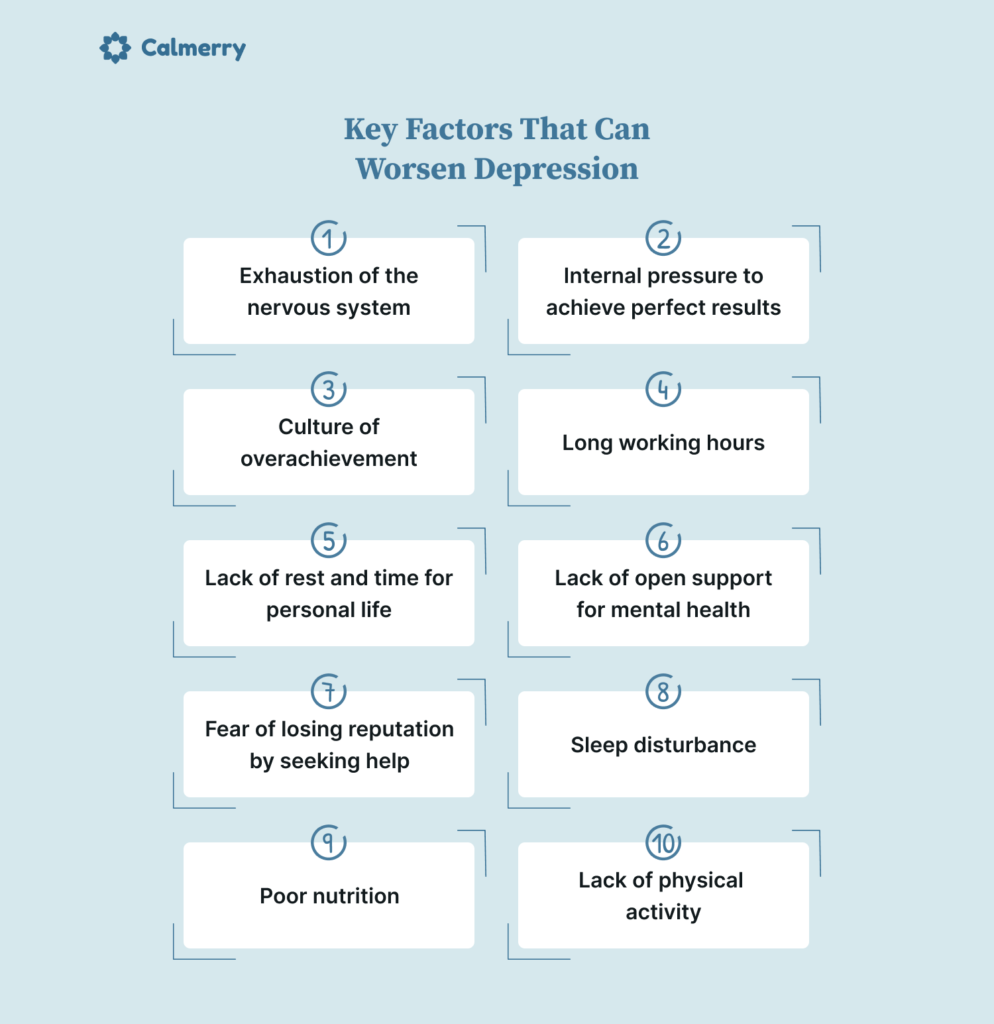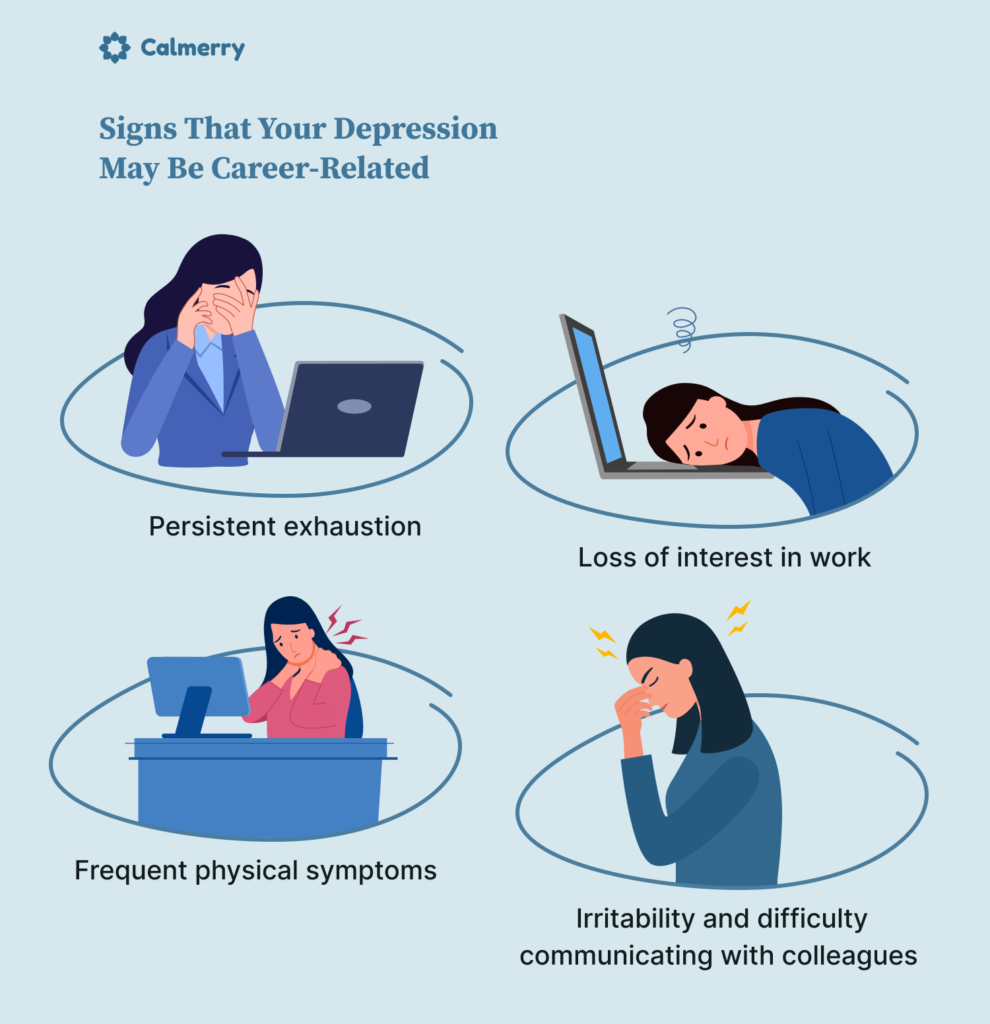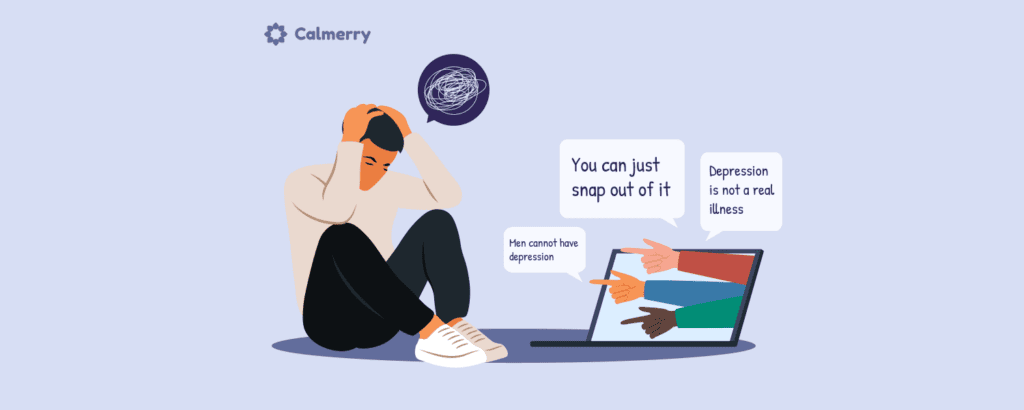What to Do When My Job Is Making Me Depressed?

In this article
If you’ve found yourself thinking, “My job is making me depressed,” you’re not by yourself. Plenty of individuals believe that, particularly in stressful occupations. Long hours and continued stress can take a toll on even the most powerful individuals. If the pressure of your job is affecting your feelings, health, or relationships, there may be a more significant issue at play.
This article examines why some occupations lead to depression. It allows you to understand whether your job impacts you in terms of mental health. Finally, it offers helpful steps to embark on healing without jeopardizing your responsibilities or your future.
What makes high-pressure careers a trigger for depression?
High-stress occupations typically require employees to continue working with little break for leisure. This can bring about feelings of depression. The pressure to perform well, adhere to strict deadlines, and stay ahead can damage self-care and mental health, particularly in occupations that value excessive work.
According to a recent study, employees who worked more than 90 hours weekly had depression scores nearly 3 times higher compared to employees who worked between 40 and 45 hours. [1] In stressful jobs, depression risk rises with hours worked, study in. (2022, October 20). Psychiatry. https://medicine.umich.edu/dept/psychiatry/news/archive/202210/stressful-jobs-depression-risk-rises-hours-worked-study-new-doctors-finds
Chronic stress can also bring about burnout, as well as emotional exhaustion. Many workers continue to overlook early symptoms of depression in order to seem strong or competent. Ambitious or family-minded people often take on more work and slowly run low on enthusiasm, happiness, and vitality. These are blatant indicators of depression rooted in work.
Key factors that can worsen depression
When your job is making you depressed, it’s rarely due to a single cause. More often, it’s a combination of overlapping stressors in both the work environment and your internal response to it. These factors can intensify depressive symptoms and make it harder to recover without support.
Some of the most common triggers in high-pressure roles include:
Exhaustion of the nervous system
Chronic stress from job pressure depletes your mental and emotional resources. This constant overactivation of the stress response can lead to psychological fatigue, leaving you emotionally numb and mentally drained.
Internal pressure to achieve perfect results
Driven professionals often set unrealistically high standards for themselves. When they fall short, even slightly, they feel inadequate. This self-imposed stress, combined with external demands, can fuel depressive thinking and a sense of failure.
Culture of overachievement
Some workplace cultures equate long hours and constant output with success. In these environments, rest is viewed as laziness, and asking for help is seen as weakness. This can discourage self-care and worsen depression at work.
Long working hours
Extended hours reduce recovery time and blur the line between work and personal life. When your job consumes most of your energy, there’s little left to nurture your emotional well-being.
Lack of rest and time for personal life
Missing out on quality time with friends, family, or hobbies can disrupt your emotional balance and weaken your resilience. Over time, disconnection from personal values and relationships contributes to burnout and isolation.
Lack of open support for mental health
Many workplaces don’t actively promote mental health awareness or offer confidential counseling and support services. This silence around mental health makes it harder to ask for help, reinforcing the stigma.
Fear of losing reputation by seeking help
Concerns about being judged, sidelined, or overlooked for promotion can stop people from seeking professional help. This fear keeps many suffering in silence even as their depressive symptoms worsen.
Sleep disturbance
Stress and anxiety often disrupt sleep, which in turn impairs cognitive function, emotional regulation, and overall well-being. Poor sleep can deepen depressive episodes and reduce coping capacity.
Poor nutrition
Skipping meals or relying on processed food due to a hectic schedule affects brain chemistry and energy levels, contributing to mood swings and fatigue.
Lack of physical activity
Without regular movement, the body misses out on natural mood stabilizers, such as endorphins. Sedentary lifestyles, which are common in high-demand desk jobs, can contribute to both physical and mental stagnation.
These factors don’t just affect your energy or mood temporarily; they can contribute to sustained psychological strain and increase the risk of burnout and long-term depression. Recognizing them is the first step in improving your mental health and regaining control.

The vicious cycle: how depression and career pressure feed each other
Depression at work doesn’t exist in a vacuum; it often becomes a self-reinforcing loop. When your job is causing psychological strain, your mental and emotional energy depletes, directly affecting your ability to perform. As productivity drops, expectations and pressure may increase, leading to deeper burnout and more severe depressive symptoms.
Depression can affect focus, memory, and decision-making, making even routine tasks feel overwhelming. Delays, mistakes, or missed deadlines may follow, which then trigger guilt, self-criticism, or fear of job loss. This response deepens the cycle: you try harder, work longer, but feel worse.
For example, someone might start staying late to “catch up,” skipping meals or sleep, and pulling away from friends or hobbies to conserve energy. Over time, their world narrows to just surviving the job. Persistent sadness, irritability, or physical symptoms, like headaches or stomach pain, become normalized. And when they finally consider quitting a job, the idea feels like failure rather than self-preservation.
Without intervention, this pattern blurs the line between job stress and a full-blown depressive episode. Recognizing this cycle early and seeking professional help can break it before the pressure fully erodes your mental health.
Signs that your depression may be career-related
When your job is making you depressed, the symptoms often blend into daily routines, making them easy to miss or dismiss. But certain patterns point to a deeper problem rooted in the workplace.
Common signs include:
- Persistent exhaustion, even after a weekend or holiday.
- Loss of interest in work that once felt meaningful or exciting.
- Frequent physical symptoms, like headaches or stomach issues, without a medical cause.
- Increased irritability and difficulty communicating with colleagues.
These signs can reflect more than just job stress, as they may signal that your work environment is affecting your mental health. If these symptoms persist, it’s time to take them seriously and consider how your job might be contributing to depression.

What you can do to cope and heal
If you’ve realized that your job is making you depressed, it’s important to know that change is possible. Dealing with depression requires a combination of self-awareness, boundaries, and support. These steps can help you regain control and improve your mental health:
Start by setting boundaries at work
Learn to say “no” to non-essential tasks that overload your schedule. Plan your workload realistically, giving yourself space to rest and recover instead of constantly pushing through.
Prioritizing self-care is equally vital
Focus on getting consistent, quality sleep to restore your nervous system. Eat balanced meals instead of skipping or rushing through food, and move your body regularly. Physical activity is a proven mood stabilizer and natural antidepressant.
Seeking professional support can make a significant difference
Speaking with a mental health professional can help you understand your symptoms and explore treatment options like depression therapy, stress management techniques, or medication if necessary. Many companies, such as Calmerry, also offer confidential counseling and support services; don’t hesitate to use them.
Build a supportive network around you
Lean on colleagues, friends, or family who understand what you’re going through. Connecting with others who’ve experienced depression at work, whether in person or online, can reduce isolation and offer practical insights.
Finally, consider whether career adjustments are needed
You might discuss schedule or workload changes with your manager, or begin exploring roles that align better with your mental health needs and personal values. And remember: your job is not your identity. Stepping away from a role that harms your well-being is an act of self-preservation.
Even if quitting a job isn’t an immediate option, these steps can help you create space for healing and shift your relationship with work toward something healthier.
When to seek immediate help
There are moments when depression at work goes beyond stress or burnout and signals a deeper psychological crisis. If you experience persistent sadness, suicidal thoughts, or extreme apathy that disrupts basic functioning, it’s critical to act immediately. These are not just signs of job stress; they may indicate a serious mental health condition that requires urgent intervention.
Other red flags include sudden behavioral changes, withdrawal from loved ones, self-harm, or dangerous coping mechanisms like substance abuse. If your job is making you depressed to the point where daily tasks feel unbearable, do not wait for it to get worse.
Seeking professional help is a sign of strength, not failure. Contact a mental health professional from Calmerry, reach out to confidential counseling and support services, or call an emergency hotline in your country. Your safety and well-being come first, even when your work environment doesn’t seem to acknowledge it.
Symptoms that cannot be ignored: suicidal thoughts, severe apathy, and behavioural changes that are dangerous to health.
Be sure to seek help from specialists, perhaps even call the hotline.
Finding balance between career and well-b eing
When your job is causing emotional strain that doesn’t fade with rest or effort, it’s more than just temporary job stress; it could be a sign of something deeper. Recognizing the psychological toll of your work environment is not a weakness; it’s a form of self-respect.
If left unchecked, the cycle of burnout, depressive symptoms, and unrealistic demands can escalate, affecting not just your productivity but also your overall quality of life. But you are not powerless. Boundaries, self-care, and honest conversations about mental health can shift the balance. So, you can reach out to a mental health professional or explore confidential online depression therapy and support services.
Most importantly, allow yourself the option to change course. Whether that means adjusting your workload, confronting workplace bullying, or quitting a job that no longer aligns with your personal values, you have the right to prioritize your well-being.
What you do matters — but so does how you feel while doing it.
In stressful jobs, depression risk rises with hours worked, study in. (2022, October 20). Psychiatry. https://medicine.umich.edu/dept/psychiatry/news/archive/202210/stressful-jobs-depression-risk-rises-hours-worked-study-new-doctors-finds
online therapy
live video session



